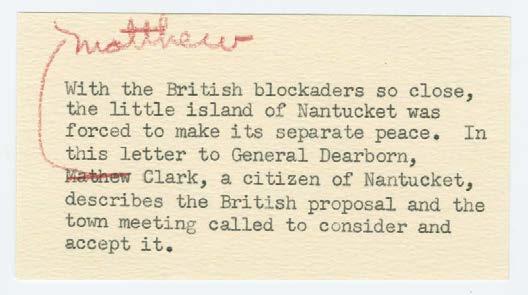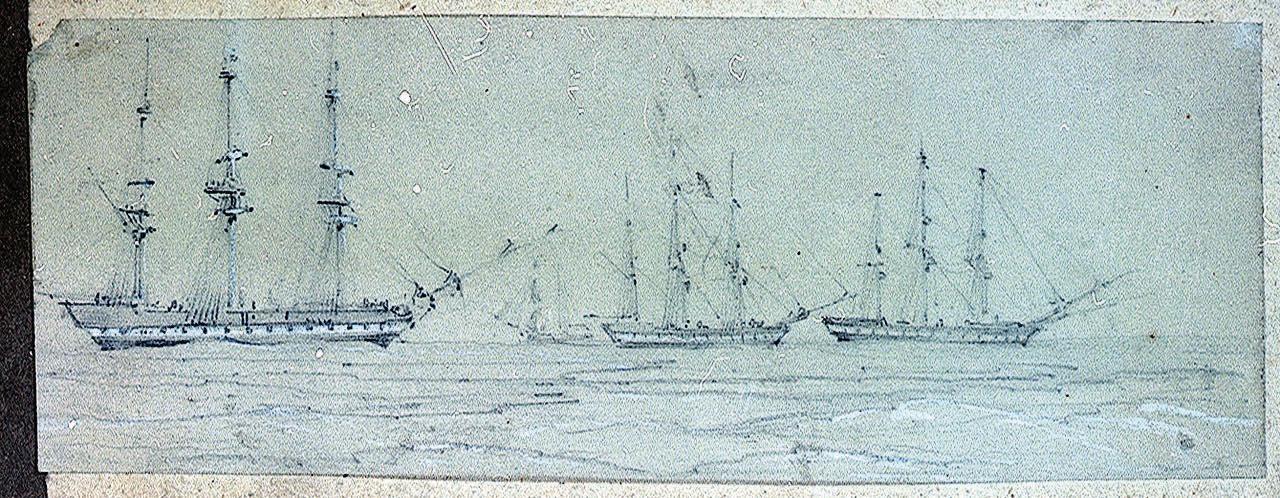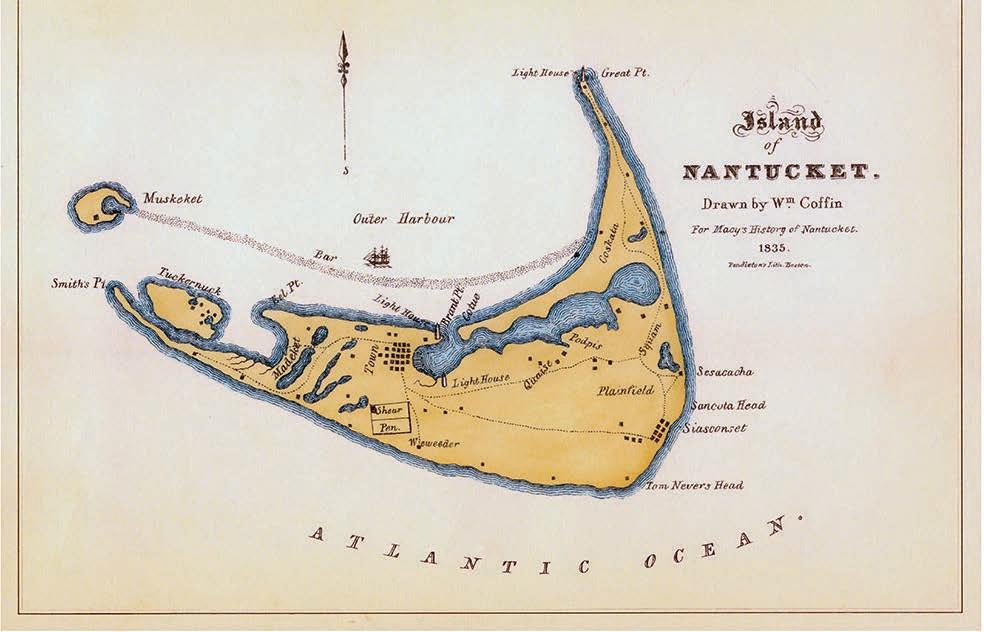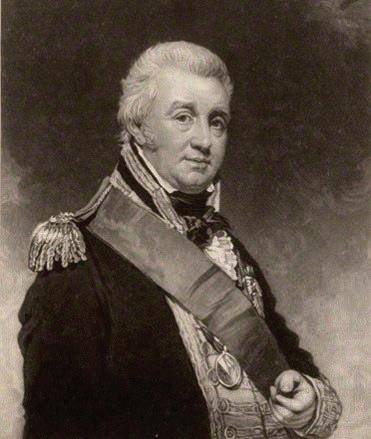
13 minute read
Nantucket's Bid for Survival during the War of 1812 by Karl Jacob
Nantucket’s Bid for Survival during the War of 1812
By Karl Jacob
In the broad context of the rich history of Nantucket, the significant role its residents played in developing and controlling much of the global whaling industry during the eighteenth and nineteenth centuries has defined the narrative of the island. Less known is an event that occurred in the early nineteenth century that, for a brief period of time, severely disrupted Nantucket’s whaling industry, exposing the island’s connection to, and total dependence, on the sea for its economic existence.
In late August 1814, at the height of the War of 1812 and in the midst of the Royal Navy’s blockade of America’s coastline, acting out of desperation, with no help from the federal or state governments, residents of Nantucket took matters into their own hands. Without consent from the Madison Administration, island representatives began negotiations with the Royal Navy which eventually led, late in the war, to a neutrality agreement between Nantucket and the United Kingdom. Nantucket’s flirtation with neutrality was nothing new. Closely tied to the British economy before the American Revolution, Nantucket showed little interest in supporting the Colonial cause for independence. During the winter of 1775, Nantucket residents successfully petitioned Parliament for an exemption from the New England Restraining Act,1 which was intended to punish the New England colonies for their belligerence by dramatically curtailing fishing in the region. The outbreak of fighting was immediately felt by Nantucket’s booming whaling business as many overseas markets for its whaling products were closed off. Being cut off from its primary market in London was especially devastating. With so many of Nantucket’s whaling merchants avowed loyalists, coupled with the loss of London as a major market for its whaling products, several influential community members proposed the island remain an independent or neutral state.2 As would
1 Parliament Act: New England Trade and Fisheries Act 1775, 15 Geo. III (c.10).
2 Nathaniel Philbrick, Away Off Shore, Nantucket and Its people 1602-1890 (Nantucket: Mill Hill Press, 1994), 139-40. happen again thirty years later, Nantucket sought to isolate itself from war. Island representatives met with British commanders in New York and Newport, and an agreement was hammered out in which “depredations should cease, provided Nantucket observe strict neutrality.”3 Some thirty years later, history repeated itself. With the stirrings of another war with the United Kingdom, residents again panicked. On May 9, 1812, weeks before war was declared, a town meeting was called in which the impacts of another war were deliberated. A petition was drawn up and sent to Congress, pleading that the United States not to go to war with Britain. The petition detailed the harsh treatment and severe impact the American Revolution had on the island. It also addressed concerns regarding Nantucket’s isolated location and how defenseless it would be to invasion.4
The pleadings fell on deaf ears. A few days after Nantucket’s residents learned that war had been declared, noted resident Kezia Coffin Fanning wrote in her diary, “Sorrow and distress are on the minds of people in consequence of War. Many families have hurried off and left.” 5 Once war broke out, as residents predicted
3 Linda S. Hinchman and Lydia S. Hitchman, “William Rotch and the Neutrality of
Nantucket during the American Revolution”, Bulletins of the Friends’ Historical
Society of Philadelphia Vol.1, No.2 (2007): 52.
4 Town Meeting, 9 May 1814, Town and County of Nantucket, Town Clerk
Archives.
5 “Keziah Coffin Fanning’s Diary,” Historic Nantucket, 5 (April 1958): 30.
and feared, the impact on Nantucket’s whaling industry was felt almost immediately. On July 9, 1812, less than one month after war was declared, while on a whaling voyage in the Atlantic, Mount Hope, a whaling schooner from the island, was burned with its catch of 170 barrels of sperm oil and its crew held prisoners.6 And while the Royal Navy’s blockade was not yet fully in place, most of the island’s whaling vessels were well out to sea in the far reaches of the Atlantic and Pacific oceans, in danger of sharing the same fate as the Mount Hope. When in February 1813 the British Parliament ordered the Royal Navy to begin blockading the United States (a tactic it had used so effectively in defeating Napoleon), the blockade order only covered the Chesapeake Bay and Delaware Bay. New England was not subject to a strict blockade early in the war, due to its historic cultural and economic ties to Britain and because the British government hoped to pry New England away from the United States. A factor in the intentionally “porous” blockade of New England was the importance of its grain crop. With failed harvests becoming a common event in Britain in the early 1800s, much of grain which fed General Wellington’s armies in the Peninsular campaigns against Napoleon did not come from Britain but from the United States.7
The situation changed dramatically in the spring of 1814. With Napoleon defeated, British reinforcements began arriving to North America from Europe. Tired of the unnecessary war with the United States and weary from two decades of wars with France, Parliament in early 1814 ordered the Royal Navy to escalate the war with America at sea.8 Responding to War Secretary Bathurst’s orders and his desire to “make mercantile centers of New England feel the pressure of war,”9 Vice Admiral Alexander Cochrane, commander-in-chief of the Royal Navy’s North Atlantic Station, issued a procla-
6 Alexander Starbuck, History of Nantucket: County, Island and Town (Boston: C.E. Goodspeed, 1924), 278.
7 NAM Rodger, The Command of the Ocean: A Naval History of Britain, 1649-1815 (New York: W.W. Norton, 2004).
8 Barry J. Lohnes, “British Naval Problems at Halifax During the War of 1812,”
The Mariner’s Mirror, 59:3 (1973): 317-333.
9 Letter from Bathurst to Sherbrooke, 6 June 1814, Public Archives of Nova Scotia, vol. 62, doc. 120; Lohnes, “British Naval Problems,” 327. Blockade Proclamation of Vice Admiral Alexander Cochrane, 25 April 1814. Courtesy of Lilly Library, Indiana University, Bloomington
mation in April 1814 extending the Royal Navy’s blockade to immediately include New England.10 The blockade straightaway impacted Nantucket disproportionately harder than the mainland. It effectively isolated the island it by shuttering its dominant employment and wealth-generating whaling industry, while cutting the island off from the mainland, from which it imported virtually all of its food and fuel. Adding to the desperation was a spiritual factor. The majority of Nantucket’s 7,000 residents were Quakers, who were strongly opposed to war. Blockading Nantucket proved to be a relatively easy assignment for the Royal Navy. Small in size (forty-eight square miles), and thirty miles from Cape Cod, Nan-
10 Proclamation dated 25 April, 1814 By the Honorable Sir Alexander Cochrane [S.1.:s.n.], 1814. Lilly Library, Indiana University, Bloomington. Letter from Vice
Admiral Sir Alexander Cochrane to John W. Croker, 28 April 1814, The National
Archives (hereinafter TNA), ADM 1/506; Lohnes, “British Naval Problems,” 327.

Graphite drawing by Edwin Hayes of fifth-rate frigates, the type of HMS Nymphe which blockaded Nantucket Harbor. National Maritime Museum, Greenwich London (PAD 9543). Transcribed letter dated August 23,1814, from Nantucket resident Matthew Clark to General Henry Dearborn, Boston. Courtesy of Lilly Library, Indiana University, Bloomington

tucket was easy to isolate. Surrounded by shallow waters and shifting sandbars and having only one narrow, navigable channel leading to its only harbor made it easy for a small blockading force of warships or privateers to completely shut things down. The ease of maintaining the blockade was demonstrated in late June 1814, when a single tender, containing one gun and twelve sailors, from the frigate HMS Nymphe blocked the entrance to the island’s harbor, making access impossible.11 Nantucket historian Edouard Stackpole wrote, “the island’s whaling fleet and coastal vessels bringing supplies from the mainland were easy prey for a host of privateers and British cruisers.”12 On August 23, 1814, Nantucket resident Matthew Clark wrote a lengthy letter to General Henry Dearborn, customs collector for the port of Boston, describing the Royal Navy brig HMS Nimrod anchoring off the Bar and sending representatives to meet
11 Horseman, “Nantucket’s Peace Treaty,” 186.
12 Edouard A. Stackpole, An Incident During The War of 1812, Nantucket Historical
Association Research Library, War of 1812 files, blue file. with town representatives. “The situation of Nantucket is truly critical; a single Gun Boat, could effectively Blockade the entrance to the Harbour, as utterly to prevent all manner of ingress and egress…the demolition of every Dwelling House and Building on the Island could be readily effected; without hazard to the enemy, as all sort of defence is utterly impracticable.”13 With their plight worsening and without much sympathy nor support from the federal or state governments, in the summer of 1814, the islanders chose to take action.
In late spring of that year, the Washington Benevolent Society, a mostly federalist island group opposed to the war, sent a committee to meet with the Royal Navy Captain David Milne, who was in charge of blockading Boston Bay. After brief negotiations, an agreement was reached to allow the islanders to send vessels to
13 Letter from dated 23 August, 1814 from Nantucket resident Matthew Clark to
General Henry Dearborn. War of 1812 mss, Lilly Library, Indiana University,
Bloomington.
Illustration by William Coffin in Obed Macy, A History of Nantucket (Boston: Hillard, Gray, 1835), iv.

the mainland to import only essential food and fuel. This didn’t last long. The agreement was rescinded on August 5, when it was found that the first vessel from the island stopped by the British squadron contained supplies being shipped for profit.14 After the failure of that effort, the islanders thought it best to deal directly with the new commander-in-chief in North America’s Atlantic blockade directly, Vice Admiral Alexander Cochrane.
On July 22, a petition signed by 225 mostly-Federalist residents of the island was sent to Cochrane seeking relief from the blockade. The appeal was based on humanitarian reasons, explaining the island’s isolation, lack of natural resources, and opposition by its dominant religious group, the Quakers, to the war.15 Not wanting to be out-done by the Federalists, town officials, mostly comprised of Madison Democrat-Republicans, called a town meeting on July 23 to discuss declining stores of supplies and how best to approach the British. The selectmen chose Silvanus Macy and Isaac Coffin to act as commissioners to negotiate with the British. They set sail aboard the sloop Hawk on July 28 for Bermuda to meet with Vice Admiral Cochrane,
14 Starbuck, Nantucket, 291-92
15 Letter from Inhabitants of Nantucket to Cochrane, 22 July 1814 TNA, ADM 1/507/260-61. where they believed he was stationed. The commissioners’ instructions from Nantucket’s governing body were explicit. They were to explain the urgent plight the blockade had placed them in and, for humanitarian reasons, plead that Cochrane grant them passports to import food and fuel from the mainland. They were also to seek permission to resume whaling and fishing, their only significant means of livelihood.16 Unbeknownst to the commissioners, when they finally caught up with and met with Cochrane in the Chesapeake in late August, he was aware of the situation and sought to exploit it. He had already directed one of his senior commanders, Rear Admiral Henry Hotham, to investigate. If the islanders’ claims were found to be true, Hotham was empowered to issue passports allowing the importation of necessary provisions. On August 23, 1814, a proposal from Hotham was delivered to the island under a flag of truce. If Nantucket’s residents were to declare themselves “absolutely neutral,” deliver up any military stores held on the island, and provide any surplus supplies to British ships, a specified number of vessels would be permitted to import wood,
16 Town Meeting, 23 July 1814, Town and County of Nantucket, Town Clerk
Archives. It was at this special Town Meeting that a delegation was appointed by Nantucket’s governing body to seek out, under a flag of truce, a meeting with Vice Admiral Cochrane regarding relief for the Island.
provisions, and other needed supplies.17 A town meeting was held that same night, and Nantucket residents officially agreed to the terms of Hotham’s neutrality offer.18 A contingent from the island set sail for Long Island, where Hotham was stationed. The neutrality agreement was signed in Hotham’s cabin aboard the HMS Superb on August 28. All of this occurred while the “official representatives” from the island were meeting with Cochrane in Chesapeake Bay. After hearing their issues, Cochrane gave the group messages to deliver to Hotham in New London. When they presented themselves to Hotham, they learned that they were behind the times. A neutrality agreement had already been negotiated. The neutrality agreement provided a degree of relief for the islanders but not nearly as much as they had hoped for. A limited number of safe-passage passports allowed Nantucket vessels to obtain provisions from the mainland, which alleviated some, but not all, shortages of food and fuel. Even with the passports, some of the island’s boats were reluctant to leave Nantucket for fear of being captured by the Royal Navy or pro-British privateers, not all of whom respected the passports’ authority. However, the key area where the Nantucketers sought relief—freedom to resume whaling—was met with a resounding rejection from Vice Admiral Cochrane. Since the neutrality agreement happened so late in the war and a peace treaty was signed on Christmas Eve 1814, the full repercussions of the agreement and how it would have withstood the delicate political balance the islanders had placed themselves in between the United States Government and Great Britain became a moot issue.
So what were Vice Admiral Cochrane’s true intentions in offering neutrality to Nantucket? Some historians have suggested it was his way of embarrassing the Madison Administration and driving a wedge between
17 Letter from Cochrane to Croker, 5 October 1814 TNA, ADM 1/507/249-51.
18 Town Meeting, 23 August 1814, Town and County of Nantucket Archives; Letter from Hotham to Cochrane, 29 August 1814 TNA, ADM 1/507/252-55, 258).
Hotham wrote to Cochrane notifying him of Nantucket’s neutrality agreement and his issuing a circular ordering ships of the Royal Navy and privateers to honor the passports he had issued. Oil painting of Vice Admiral Alexander Cochrane (Library of Congress LC-USZ62-69137).

the island and the U.S. government.19 Others believe he wanted to coax the skilled Nantucket whalers, with their lucrative whaling industry, to move their operations to British territories, preferably Nova Scotia.20 Or perhaps it was just a humane gesture from what many historians consider a cold and calculating man. In much of this bit of history, the United States Government remained indistinct and silent. This was due in part to its lack of a naval force sufficient to break the blockade. There was also little sentiment within the Madison Administration to aid the islanders given their pro-British and anti-war leanings. In the end, however, the overriding factor preventing the federal government from focusing on Nantucket’s plight was a much larger, immediate issue—its own survival.
19 Ellis, A Ruinous and Unhappy War, 193; Eric Jay Dolin, Leviathan: The History of Whaling in America (New York: W.W. Norton & Co., 2007), 203; Willard Sterne
Randall, Unshackling America: How the War of 1812 Truly Ended the American
Revolution (New York: St. Martin’s Press, 2017), 312-313; Horsman, “Nantucket’s
Peace Treaty,” 180.
20 Dolin, Leviathan, 203; Horsman, “Nantucket’s Peace Treaty,” 180, 190.




